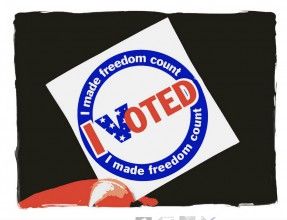Study: Auto voter registration adds 2 million voters in first year
by Matt Fleming | June 15, 2016 9:01 pm
 California’s electorate could grow by more than 2 million voters once a new law implementing automatic registration through the DMV starts working in 2017, according to a new study.
California’s electorate could grow by more than 2 million voters once a new law implementing automatic registration through the DMV starts working in 2017, according to a new study.
The study[1], conducted by the Public Policy Institute of California, predicts that as voter registration increases, so will diversity in the electorate among underrepresented groups.
However, determining how much the electorate will grow largely depends on the rate with which eligible voters decline automatic registration at the DMV, according to the study.
How it works
Under the new law, the DMV will transfer data on customers, who come in for a new license or a renewal, to the Secretary of State for automatic voter registration. However, the individual can decline to participate in the process. This process is estimated to start in July 2017.
As a benchmark, the study used statistics from Oregon, where 7 percent of eligible voters declined automatic enrollment under a similar law.
About 7.4 million Californians are eligible to vote but remain unregistered.
Increases diversity
The new law will increase the share of the electorate for underrepresented groups. Latinos would increase their share by 4 percent, up to almost 28 percent. Asian/Pacific Islanders would jump to 16.6 percent, an increase of 1.7 percent.
The gains made by Latinos and Asian/Pacific Islanders would have a diminishing effect on African American’s share of the electorate, as their share would decrease slightly to 7.3 percent — a loss of .2 percent.
The largest jump would be among Californians with no college education, who would increase their share of the electorate from 26.8 percent to 33.1 percent.
“In general, registering the unregistered population involves bringing a very different group of people into the electorate: one that is younger, more diverse, more mobile, poorer, and less educated,” writes the study’s authors Eric McGhee, a research fellow at PPIC and Mindy Romero, founder and director of the California Civic Engagement Project at the UC Davis Center for Regional Change.
Will it lead to turnout?
Despite the new law increasing the share of the electorate among underrepresented groups, gaps will persist. For example, voters with two foreign-born parents currently experience a 15-percentage-point gap between their share of the adult population and their share of the electorate. The new law would shrink that gap to below 11 points.
The study’s authors concede that it’s difficult to determine exactly how large the new electorate will be, with the rate of declining to register as the largest variable. And the larger registration rates will not necessarily boost voter turnout, which has been decreasing for decades, but was particularly low in the 2012 primary.
“Even if (the new system) does significantly boost registration, it does not solve the problem of low turnout; it simply removes one barrier to participation,” wrote McGhee and Romero. “Many of the new registrants will be coming from disadvantaged communities and will be disengaged from politics, never having been contacted by any candidate or campaign.”
- study: http://go.pardot.com/e/156151/main-publication-asp-i-1201/3llc1/62754358
Source URL: https://calwatchdog.com/2016/06/15/study-new-law-will-add-2-million-voters-first-year-dmv/